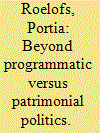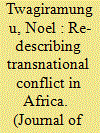|
|
|
Sort Order |
|
|
|
Items / Page
|
|
|
|
|
|
|
| Srl | Item |
| 1 |
ID:
170206


|
|
|
|
|
| Summary/Abstract |
This article argues against the long-standing instinct to read African politics in terms of programmatic versus patrimonial politics. Unlike the assumptions of much of the current quantitative literature, there are substantive political struggles that go beyond ‘public goods good, private goods bad’. Scholarly framings serve to obscure the essentially contested nature of what counts as legitimate distribution. This article uses the recent political history of the Lagos Model in south-west Nigeria to show that the idea of patrimonial versus programmatic politics does not stand outside of politics but is in itself a politically constructed distinction. In adopting it a priori as scholars we commit ourselves to seeing the world through the eyes of a specific, often elite, constituency that makes up only part of the rich landscape of normative political contestation in Nigeria. Finally, the example of a large-scale empowerment scheme in Oyo State shows the complexity of politicians’ attempts to render distribution legitimate to different audiences at once.
|
|
|
|
|
|
|
|
|
|
|
|
|
|
|
|
| 2 |
ID:
170203


|
|
|
|
|
| Summary/Abstract |
In the years following Rwanda's civil war, the country has remembered those killed in the 1994 genocide with 100 days of official commemoration, known as Kwibuka. The temporary commemoration period is characterised by an explicit acknowledgement and public discussion of ethnic identity, which stands in puzzling contrast to the state's policy of ethnic non-recognition, enforced during the rest of the year in hopes of achieving national homogeneity (Ndi Umunyarwanda). Thus, one observes seemingly diametrically opposed practices of legally erasing identity groups because of their link to conflict and a unique, three month-long saturation of reminders in the form of public speeches, memorial programming and burials, and commemorative signage. A blurring of ‘Tutsi’ with ‘survivor’ and the deliberate passing down of survivor identity to Tutsi youth have created, over time, conditions for a ‘survivor nationalism’, which exacerbates social tensions and risks sustainable peace in the long term.
|
|
|
|
|
|
|
|
|
|
|
|
|
|
|
|
| 3 |
ID:
170207


|
|
|
|
|
| Summary/Abstract |
In 2015, South Sudan increased the number of its states from 10 to 28, followed by four more states in 2017. The redrawing of internal borders came through presidential decree as South Sudan's violent civil war continued to unfold. This development has led to two ardent voices: one arguing to maintain the new states, and another advocating to reverse them. Applying argumentation theory and critical discourse analysis to news articles, analysis pieces, and press releases collected from Gurtong and Sudan Tribune from July 2015 to April 2017, this article assesses the argument advanced by both camps and evaluates their implications for peace in South Sudan. In examining the claim, the counter-claim, and their underlying premises, the article finds areas of contention and convergence between the two camps and argues for the compatibility of the values which undergird both positions.
|
|
|
|
|
|
|
|
|
|
|
|
|
|
|
|
| 4 |
ID:
170208


|
|
|
|
|
| Summary/Abstract |
Following the adoption of the Senegalese Law on Parity and the subsequent influx of women to the National Assembly, we saw a strong gendered polarisation of attitudes towards women as political leaders among the Senegalese population. This study explores whether similar attitudinal changes are found among political elites in the Senegalese National Assembly. Theory suggests that an increase in the number of women elected to legislatures (‘descriptive representation’) will challenge people's perceptions of politics as a male domain and strengthen belief in women's ability to govern (‘symbolic representation’). Although the effects of gender quotas on women's representation has received considerable scholarly attention, the field of symbolic representation remains under-studied. A case study of the effects of the Senegalese parity law addresses this knowledge gap, contributing with new empirical insights. This study also develops indicators that can help measure potential developments in the symbolic representation of women. Parity appears to have contributed to slightly more acceptance towards women as political leaders within the National Assembly. The findings are discussed in the last section.
|
|
|
|
|
|
|
|
|
|
|
|
|
|
|
|
| 5 |
ID:
170204


|
|
|
|
|
| Summary/Abstract |
This paper discusses the principal findings of a new integrated dataset of transnational armed conflict in Africa. Existing Africa conflict datasets have systematically under-represented the extent of cross-border state support to belligerent parties in internal armed conflicts as well as the number of incidents of covert cross-border armed intervention and incidents of using armed force to threaten a neighbouring state. Based on the method of ‘redescribing’ datapoints in existing datasets, notably the Uppsala Conflict Data Project, the Transnational Conflict in Africa (TCA) data include numerous missing incidents of transnational armed conflict and reclassify many more. The data indicate that (i) trans-nationality is a major feature of armed conflict in Africa, (ii) most so-called ‘civil wars’ are internationalised and (iii) the dominant definitions of ‘interstate conflict’ and ‘civil war’ are too narrow to capture the particularities of Africa's wars. While conventional interstate war remains rare, interstate rivalry using military means is common. The dataset opens up a research agenda for studying the drivers, patterns and instruments of African interstate rivalries. These findings have important implications for conflict prevention, management and resolution policies.
|
|
|
|
|
|
|
|
|
|
|
|
|
|
|
|
| 6 |
ID:
170205


|
|
|
|
|
| Summary/Abstract |
Why would rural Malian women express interest in political participation? Mali implemented a gender quota during the 2016 local elections. In a rural village where I conducted immersive research, the majority of women I interviewed following the 2016 poll expressed interest in running for local office in the future. Scholars of women's political participation theorise that quotas bring women to elected office and increase women's political participation. These theoretical perspectives cannot fully explain why women in rural Mali would express enthusiastic interest in political participation. These women participate extensively in savings and credit associations. Drawing on data generated through engagement with women in their daily lives, I explore how economic advancement can shape women's participatory aspirations. Examining longer-term changes in the local political economy of this rural village provides a deeper understanding of why women responded positively to a new institutional opening for political participation.
|
|
|
|
|
|
|
|
|
|
|
|
|
|
|
|
|
|
|
|
|